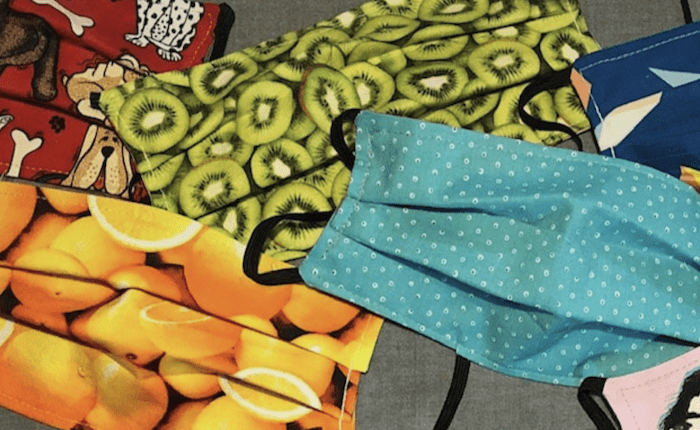
“Spit Spreads Death: The Influenza Pandemic of 1918-19 in Philadelphia,” an exhibition at the Mutter Museum in Philadelphia that opened in the fall of 2019, explored how neighborhoods in Philadelphia were impacted, how the disease spread, and what could happen in future pandemics.” It seems prescient, given the White House Coronavirus Task Force’s pivot to recommending everyone wear face masks in public settings to prevent the transmission of the virus by spitting while talking (in addition to sneezing and coughing).
Your friend who was talking a little too fast or that jogger panting “excuse me” on the bike path might be the asymptomatic carrier you’ve been trying to avoid. Unfortunately, it’s next to impossible for Boston area residents to buy proper surgical masks locally. And businesses where you would expect to be able to find cloth masks either aren’t selling them to the general public—or aren’t making them at all.
Gather Here, a community of craft artisans based in Cambridge, is making masks for healthcare employees and essential workers as part of the Boston Area Mask Initiative. As of this writing, 12,450 masks have been requested and 3,469 have been sewn and distributed. Virginia Johnson, owner of Gather Here, said there has been an uptick in demand from essential workers and on Thursday alone, 450 masks were donated by 8 crafters. Due to the closure of non-essential businesses, she had to furlough some of her team. She and two others continue to sew about 75 masks a week in addition to sourcing materials for kits distributed to crafters. Given the huge gap between the need and supply, Johnson doesn’t foresee selling masks to the general population.
Neither D Squared in Somerville nor Susanna in Cambridge foresee selling masks either. Amy Driscoll, owner of Susanna, cited lack of cash flow, staff time, and distribution as obstacles. Concerned about infecting her young child, she didn’t enter her store for two weeks. She has been taking orders over the phone, and while demand is down, she is barely able to fulfill shipments since her employees have been furloughed due to the business shutdown. Curbside pickup would be labor-intensive and the cost of shipping likely prohibitive. Some customers have cut back on spending or lost jobs, but others have increased purchasing as they want to support her business.
However, it is possible to buy masks further afield.
Zooguu, a business located in Nahant, is selling cloth masks and scrub caps online for $10 each. Buyers can also click a button to donate masks to someone in need. Owner Jen Gubicza said demand has skyrocketed and had stayed up most of the night fulfilling orders for 60 masks. While we were on the phone, 20 more were ordered. Because of social distancing, she doesn’t have help in her studio, but she is considering dropping off fabric to increase capacity.
Cloth masks are available on Etsy and Ebay for around $10 each. Some include charcoal and other types of filters.
A potential source of large quantities of masks is New Hampshire company Circular Blu, via their production plant, UnWrapped, in Lowell, MA. They have shifted from manufacturing tote bags to face masks and head covers using a material called sterilization wrap, a non-woven polypropylene fabric. The fabric manufacturer has found very high bacterial filtration efficiency, however the masks have not been tested to be considered medical devices, so they are concentrating on companies employing essential workers, such as a cleaning company, or grocery stores. Even at a maximum capacity of 50,000 a day, orders are outpacing supply. To increase production, they are reaching out to area “cut and sew” shops in New England where they supply the fabric and templates and the shops distribute the masks directly to business for their employees and potentially retailers for sales.
There are also a plethora of DIY designs to choose from. The CDC has one “sew” and two “non-sew” designs here. Masks4All.co has non-sew and sew versions along with a great deal of data backing up the effectiveness of masks. The US Surgeon General released a simple non-sew design using a t-shirt and two rubber bands. If you wear glasses, a bendable nose piece (folded pipe cleaner, rectangle cut from aluminum can, or florist wire) will reduce fogging. If you’re crafty and have a machine, two designs can be found here.
And for those who want a statement mask to go with your statement earrings, check out the designs from February’s fashion week in London. But only at the grocery store, please.
